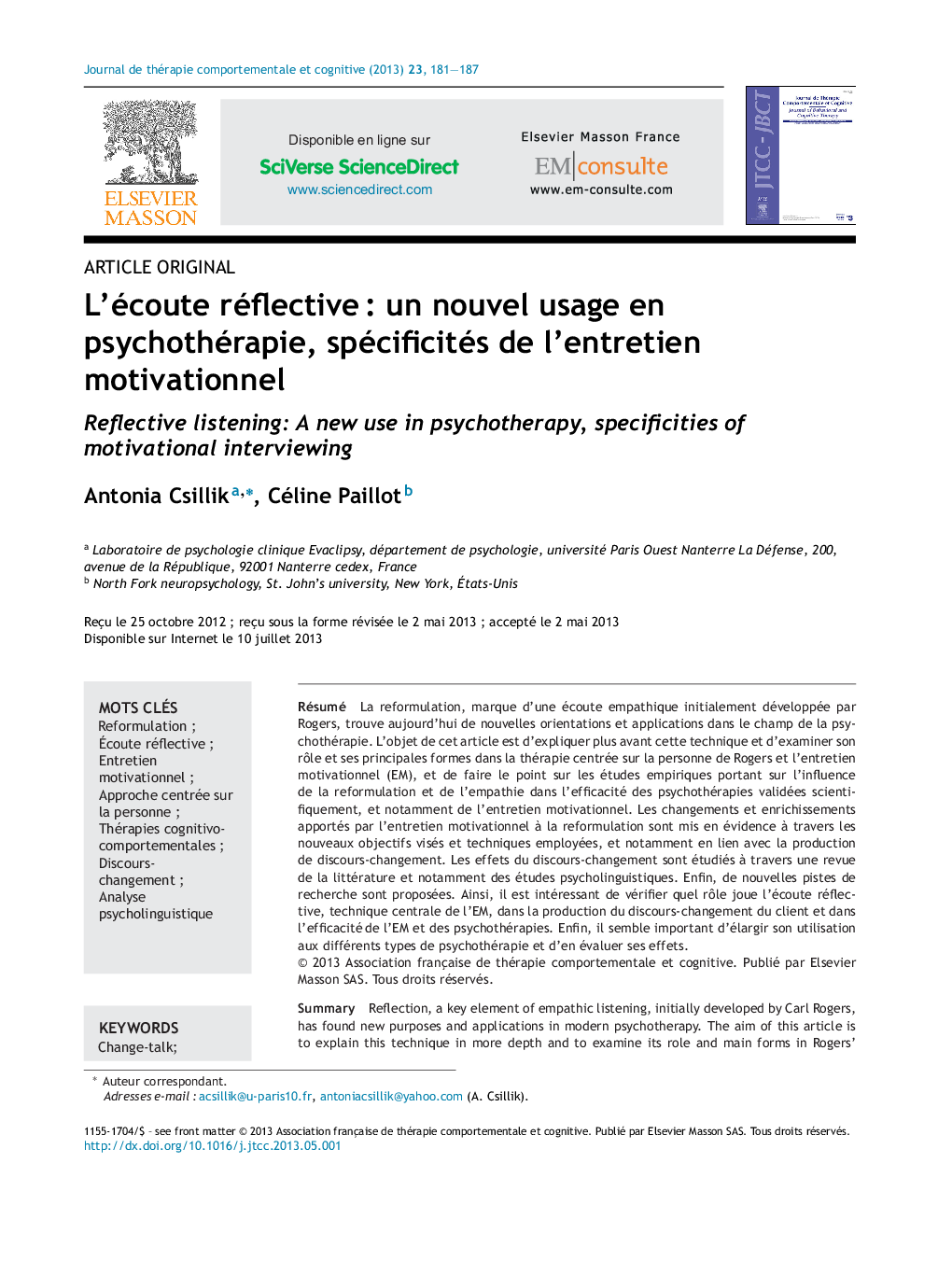| کد مقاله | کد نشریه | سال انتشار | مقاله انگلیسی | نسخه تمام متن |
|---|---|---|---|---|
| 934289 | 923633 | 2013 | 7 صفحه PDF | دانلود رایگان |
عنوان انگلیسی مقاله ISI
L'écoute réflective : un nouvel usage en psychothérapie, spécificités de l'entretien motivationnel
دانلود مقاله + سفارش ترجمه
دانلود مقاله ISI انگلیسی
رایگان برای ایرانیان
کلمات کلیدی
موضوعات مرتبط
علوم پزشکی و سلامت
پزشکی و دندانپزشکی
روانپزشکی و بهداشت روانی
پیش نمایش صفحه اول مقاله

چکیده انگلیسی
Reflection, a key element of empathic listening, initially developed by Carl Rogers, has found new purposes and applications in modern psychotherapy. The aim of this article is to explain this technique in more depth and to examine its role and main forms in Rogers' client-centered therapy and motivational interviewing (MI), and to review empirical studies based on the influence of reflection and empathy in the effectiveness of empirically validated psychotherapies, and in particular MI. In fact, in the Rogers' approach, (Rogers et Kinget, 1962 [2]), as well as in MI and in CBT, in spite of their orientation towards change and a certain directivity, reflection is considered as the main way to express accurate empathy. Empathy is a central feature in several therapeutic approaches and has been particularly associated with positive results in the treatment of various problems (Miller et Rollnick, 2002; Miller et Baca, 1982; Greenberb et al., 2001 [8-10]). This therapeutic attitude, widely used by Rogers (1951, 1959, 1968 [11-13]), has been adopted by the authors of MI, Miller et Rollnick (2002, 1991 [4,8]), as well as by other forms of effective psychotherapies. Reflective listening plays a central role in both MI and the Rogers's client-centered approach; in MI, it was adopted and enriched with new, more complex forms, as well as with objectives which differ from Rogers' approach. In MI, the client's talk which reflect their intentions to change (change-talk) are predominantly reflected upon. MI requires thus a selective method of response to the client's speech to reduce ambivalence and guide the person towards change. Four sub-categories, including cognitive, emotional and behavioral dimensions of commitment to change, constitute the preparatory change-talk: the desire, ability, reason and need to change, “commitment” and the “first steps”. The sustain talk consists of statements opposing change, and resistance talk consists of interruptions and disagreements with the therapist. According to Miller et Rose (2009 [18]), the effectiveness of MI is based on its influence on change-talk. These authors hypothesized that behavioral change is directly linked to client change-talk during MI sessions, and that it is inversely linked to sustain talk. According to those authors, the effective use of the MI technique increases change-talk in clients and reduces sustain talk, which predicts effective change in behavior. Studies comparing MI to more traditional treatment models or minimal intervention show the links between MI-consistent behaviors and the emergence of more change-talk compared with other approaches or minimal intervention (Apodaca et Longabaugh, 2009; Moyers et al., 2007 [23,24]). Current research by Amrhein et al. (Amrhein et al., 2003; Amrhein, 2004 [14,26]) shows that the intensity of commitment to change by the client and the first steps predict long-term change in behavior. Expressions of change-talk such as desire, ability, the reason and the need to change do not systematically initiate change but they announce the reinforcement of commitment to change. The effect of the intensity of client commitment talk on behavior change has been verified in a study on CBT for hospitalized cocaine addicts (Aharonovich et al., 2008 [27]). In conclusion, reflection allows the therapist to evoke the client's statements in the direction of the desired change, and to reinforce it, which should then lead to an effective change in behavior. However, it is still too early to make any conclusions about the efficiency of reflective listening. Despite its frequent use in psychotherapy, the specific therapeutic effectiveness of reflecting is still rarely assessed in empirical studies. It would thus be interesting to assess the role that reflective listening, a central technique in MI, plays in the production of the client's change-talk, in the building of the therapeutic alliance and in the effectiveness of MI and other empirically validated psychotherapies. Finally, it is important to expand its use to different types of psychotherapy and to assess its impact.
ناشر
Database: Elsevier - ScienceDirect (ساینس دایرکت)
Journal: Journal de Thérapie Comportementale et Cognitive - Volume 23, Issue 4, December 2013, Pages 181-187
Journal: Journal de Thérapie Comportementale et Cognitive - Volume 23, Issue 4, December 2013, Pages 181-187
نویسندگان
Antonia Csillik, Céline Paillot,